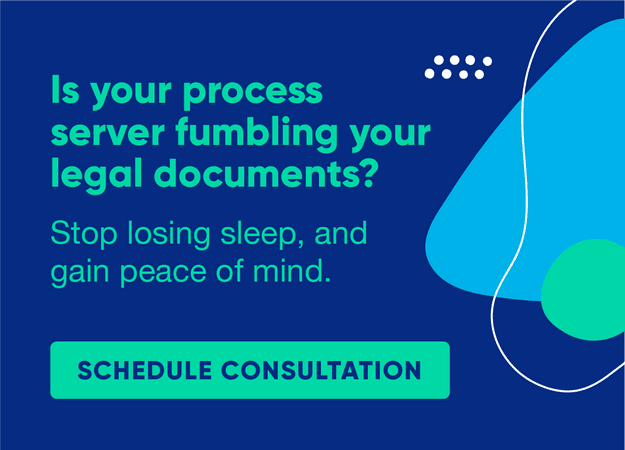Understanding California Court E-Filing Fees and EFSP Service Charges
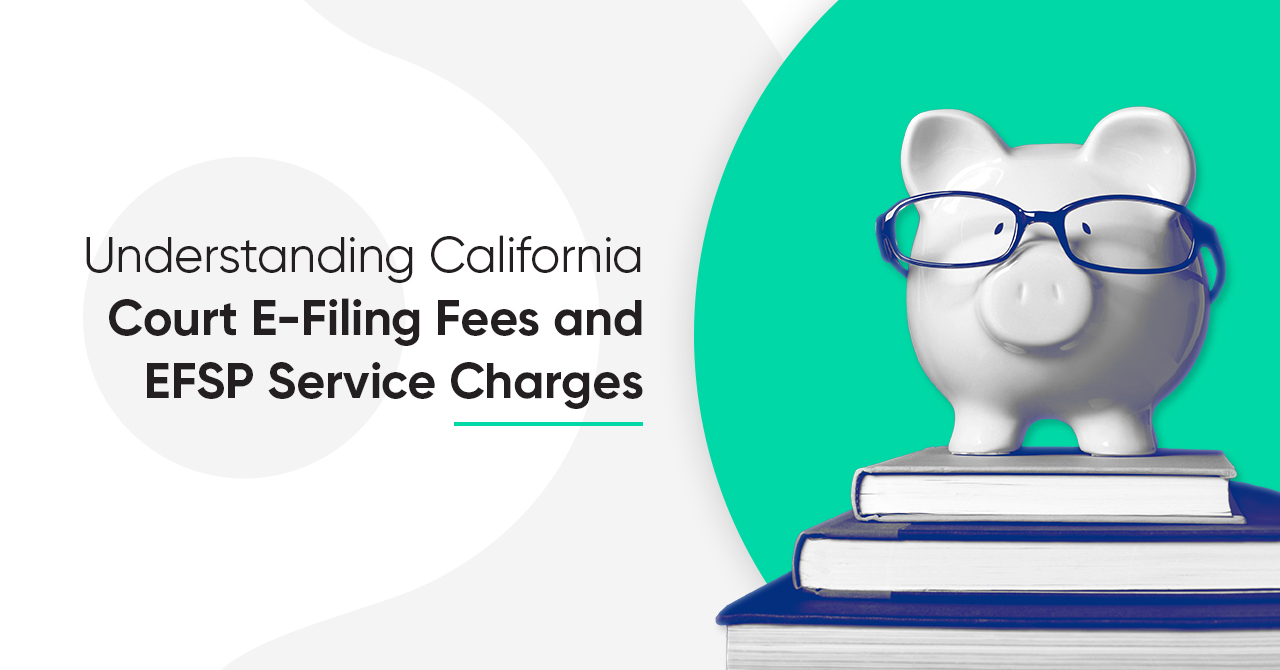
Electronic filing has revolutionized the administration of justice by streamlining court processes and facilitating convenience for both the courts and filers. In our article, “Exploring Stakeholders in the California Court eFiling Workflow”, we examined the main stakeholders of the California Court eFiling system. However, understanding the associated eFiling transaction fees, including court fees and EFSP (Electronic Filing Service Provider) service charges, is essential for filers and legal professionals to recognize. Read on to learn what each fee is, why it exists, and what more you need to know.
An Explanation of eFiling-related Fees and Charges
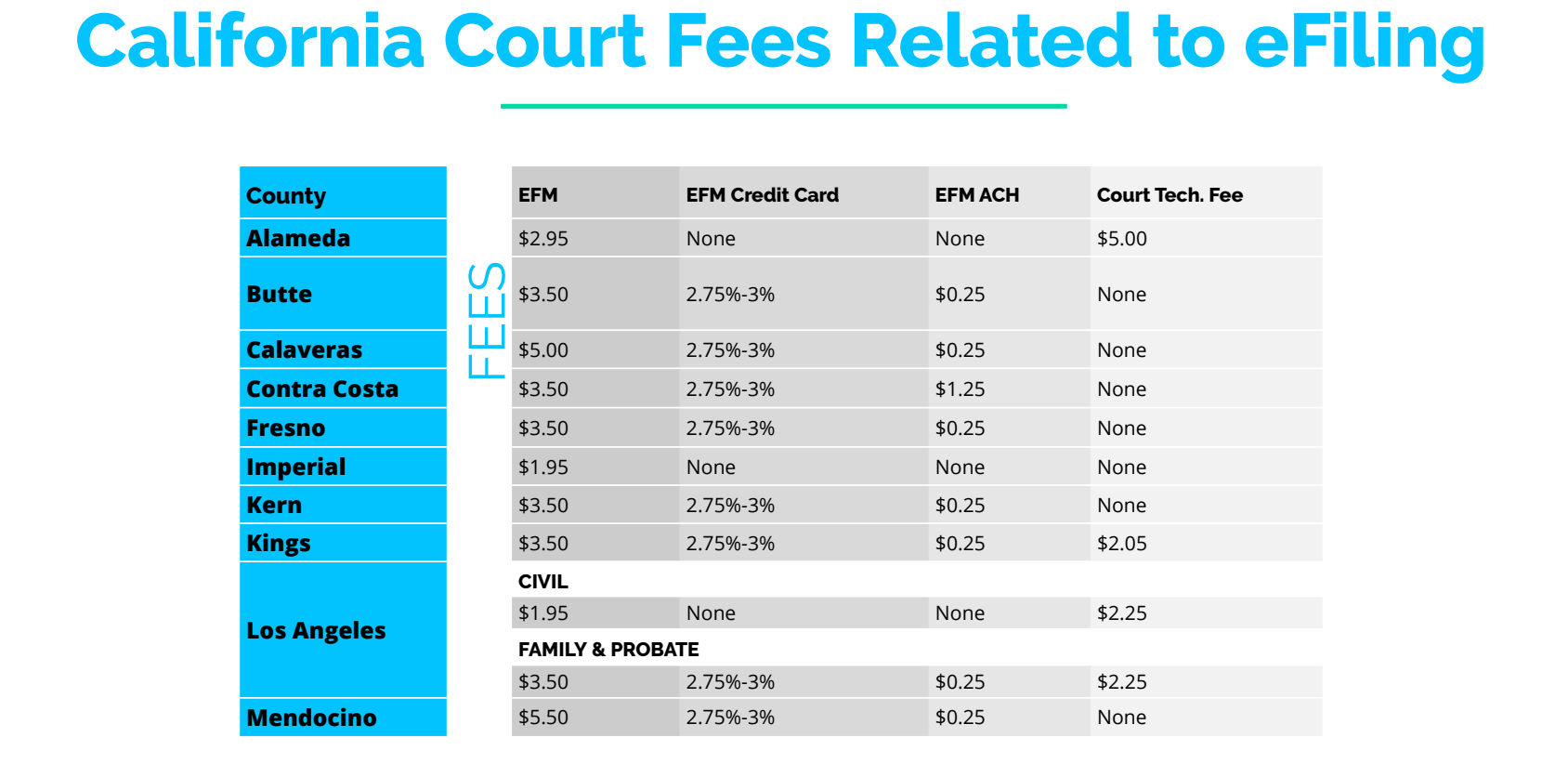
There are four main types of eFilling-related fees:
- EFM Fees: As a refresher, an Electronic Filing Manager (EFM) is a firewall software layer between outside parties and the court system. Courts do not typically have their own technology development capabilities, so they rely on third-party EFM software providers to integrate with the court’s case management system. This is how California courts enable electronic filing. Two primary EFMs in California are Tyler Technologies (Tyler) and Journal Technologies Inc (JTI). They charge filers an ‘EFM fee’ for allowing users’ documents to be eFiled with the court. This fee is to offset the costs that EFMs incur to develop and maintain their EFM software, as well as to absorb any costs from the court.
- Court Technology Fees: There’s also a fee known as the court technology fee. Some courts charge this fee to help recover their eFiling-related technology investment.
- EFM Credit Card Fees and/or EFM ACH Fees: The court or its software vendors determine whether filers can use ACH and credit cards payment methods when submitting eFiling orders. To enable credit card payments, credit card companies charge merchant fees or payment processing fees which can be incurred by the court or software vendors. To offset those types of expenses, the court or vendor can apply a court convenience fee to filers.
- Service Charges: These are the only fees paid to Rapid Legal, or the EFSP of choice, for its services.
Court fees are paid in advance by Rapid Legal, or the EFSP, to the courts on behalf of law firms and filers. EFM fees are also paid in advance by Rapid Legal to the court or the court’s case management vendor for each eFiling.
Sample Invoice for an eFiling Transaction
This sample invoice itemizes the fees due for each eFiling transaction by Rapid Legal.
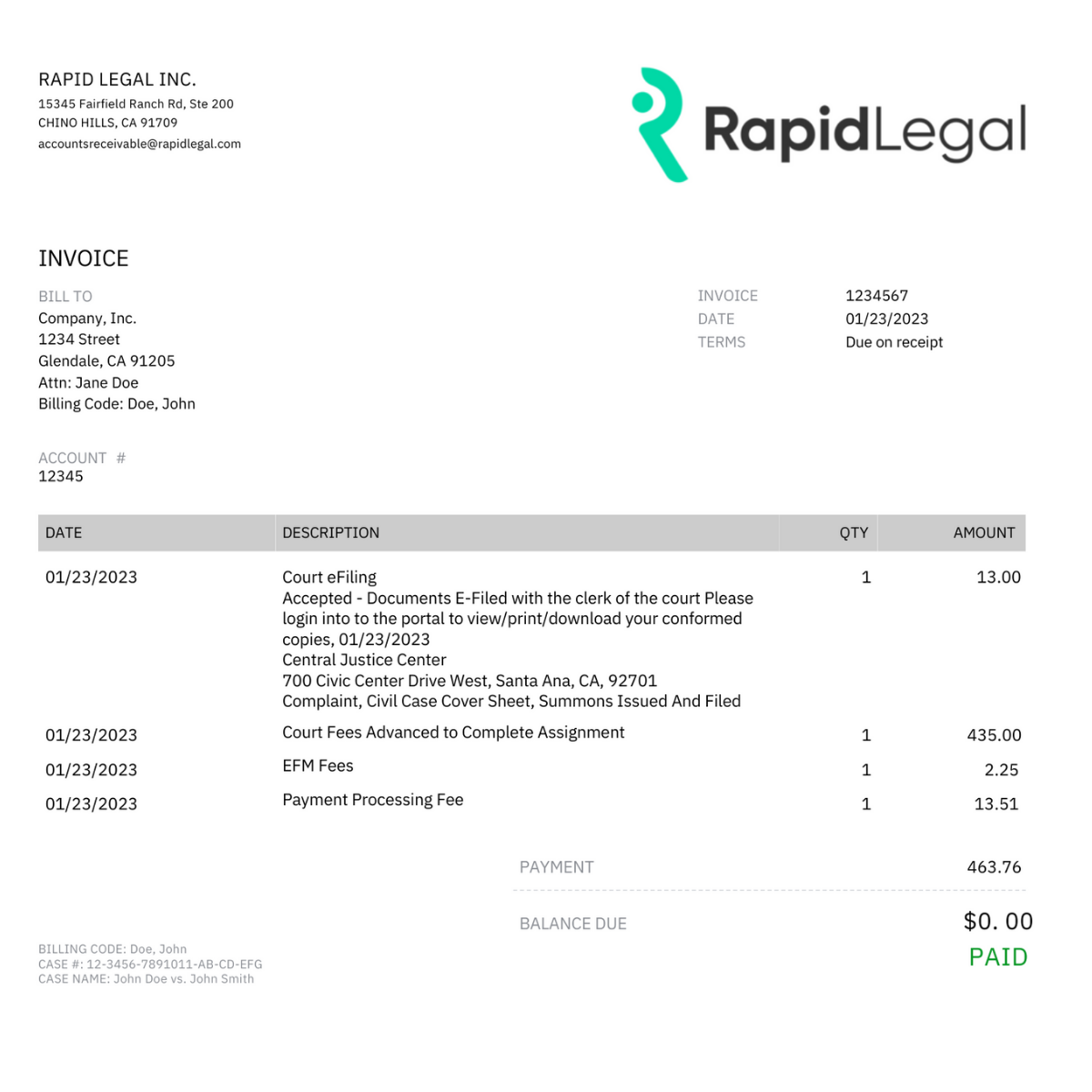
- Court eFiling (Service Fee): This is the only fee paid to Rapid Legal for its eFiling service.
- Court Fees Advanced to Complete Assignment: These are civil fees that are required by the court. Fees vary based on cases and documents filed.
- EFM Fee: This is the EFM’s fee for facilitating the transmission of a filing between the EFSP and the court, on behalf of the filer.
- Payment Processing Fee: This fee is charged to recover the costs merchants, like Rapid Legal, pay to enable customers to use a bank account or credit card for eFiling and other court services.
Please note: The sample invoice is subject to change and is used for explanatory purposes in this article only.
eFiling Knowledge is Power
Comprehending the nuances of eFiling-related fees and charges empowers legal professionals and filers to navigate eFiling-related costs. These fees primarily consist of Electronic Filing Manager (EFM) fees, Court Technology fees, EFM Credit Card or ACH fees, and Service Charges. The EFM fees are crucial for facilitating eFiling by acting as a bridge between filers and the court system. Court Technology fees assist in recovering the technological investments made by the courts in enabling eFiling. EFM Credit Card or ACH fees offset the costs associated with payment processing methods, ensuring convenient transactions for filers. Additionally, Service Charges encompass the fees paid to the Electronic Filing Service Provider (EFSP) for their valuable services.
Rapid Legal eFiles into all eFiling-enabled California counties.
Learn how to do it right with our Complete Beginner’s Guide to eFiling.
Furthermore, we provided a breakdown of a sample invoice for an eFiling transaction, illustrating the various fees involved, including the Court eFiling service fee, court fees advanced to complete assignments, EFM fees, and payment processing fees. This detailed invoice serves as a helpful reference to elucidate the fees associated with eFiling transactions.
Advocating Transparent Fee Structures and Pricing for Success
By now, you have gained a comprehensive understanding of eFiling-associated fees and their purpose. At Rapid Legal, we prioritize simple, clear fee structures and pricing for law firms.
Reach out to us today to schedule a demo or arrange a call with a Rapid Legal account manager. Discover how we can become your strategic ally, aiding your law firm in effectively handling eFiling fees and efficiently managing costs related to litigation support services.
The Paralegal’s Guide to Interstate Service of Process
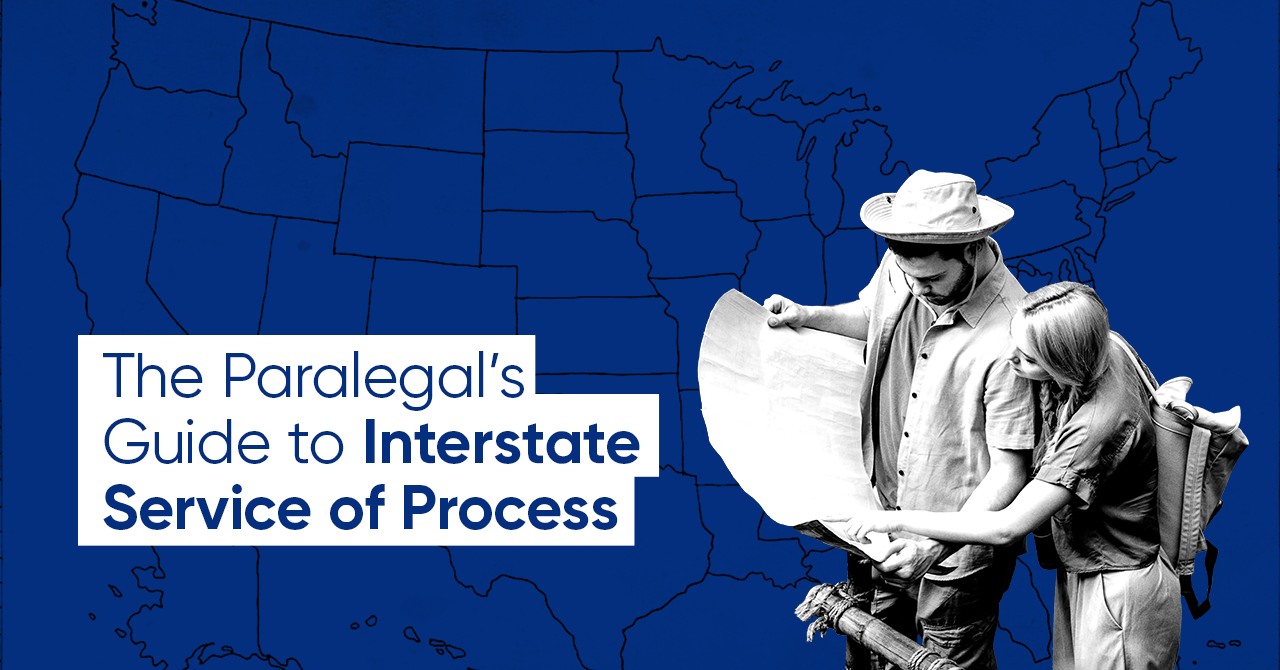
Service of process is a critical step in the legal system, ensuring that individuals and entities are properly informed of legal actions brought against them. However, the process can become complex when it involves parties in different states. As a paralegal, understanding the intricacies of interstate service of process is essential for effective legal support. This guide aims to shed light on the key aspects of serving process across state lines.
Table of Contents
Understanding Interstate Service of Process
Interstate service of process refers to the act of serving legal documents on a party located in a different state than where the legal action is initiated. Each state has its own set of rules and regulations governing this process, making it crucial for paralegals to familiarize themselves with both the rules of the state where the case is filed (the originating state) and the rules of the state where service is to be made (the receiving state).
Compliance with Laws in the Receiving State
Before initiating service of process in a different state, it’s vital to research and comprehend the service of process laws and regulations in that specific state. The receiving state may have unique requirements regarding acceptable methods of service, timeframes for response, and other important details that must be strictly followed. Therefore, jurisdiction research is essential for paralegals that are conducting interstate service of process. For instance, in California, legal documents may be sub-served after three unsuccessful attempts, while in Florida, only one unsuccessful attempt might be required.
Paralegals must approach cautiously as this variability can be observed in several states. Not only are state laws crucial to research but every local county can have a unique set of regulations regarding service of process. In California, for instance, the rules for service of process can vary from one county to another. Some counties may require up to four unsuccessful service attempts, while others, such as Orange County and Los Angeles County, require only three attempts.
Further, engaging local counsel in the receiving state is often prudent. They possess an in-depth understanding of the local laws, rules, and procedures, and can provide valuable insights and guidance to ensure compliant and effective service of process.
Methods of Interstate Service
Several methods can be employed to serve process across state lines, including:
a. Personal Service
In some cases, a process server physically travels to the recipient’s location in the receiving state to personally deliver the legal documents. This method is often considered the most reliable and legally robust.
b. Service by Mail
Certain states allow service of process via certified mail with return receipt requested. However, it’s important to verify if the receiving state permits this method and if any additional steps are required for it to be legally recognized.
c. Designated Agent Service
Many states require entities, like corporations or limited liability companies, to designate an agent to accept service of process. Serving the designated agent in the receiving state is a common and accepted method.
The Golden Rule: Document Everything
The golden rule is to document everything. Documenting the entire process of service, including dates, methods used, and responses received, is essential. Accurate record-keeping helps in case management, compliance verification, and potential challenges related to service. Instructing your process server to jot down details like the cars parked nearby and their license plates can be a lifesaver in the long run because you never know when you’ll need that information.
Why is having such documentation vital?
- Serves can get challenged months down the road
- Most servers are swamped with 20+ documents daily
- Servers are human! Sometimes memory escapes them!
Things like tattoos and glasses? They’re like a server’s secret weapon – they help identify the right person. And trust me, those notes hold up like gold if your service gets rejected.
Sometimes … your safety net is a Harley Davidson tattoo. Our veteran process serving manager shared this anecdote:
“Months after a serve, ‘John Doe,’ the individual being served, insisted in court that he had never been served. But our server had noted a Harley Davidson tattoo on his upper arm. Fast forward to the courtroom, where the judge had John Doe remove his shirt, and voila, the Harley Davidson tattoo was right there on his arm, saving the day. It just goes to show those notes can make or break a successful serve!”
Other Key Considerations
Clear and efficient communication with all parties involved, including the process server, local counsel, and the court in the originating state, is crucial for seamless coordination throughout the service of process procedure.
And if serving process internationally, the Hague Convention on the Service Abroad of Judicial and Extrajudicial Documents should be consulted. The convention provides a standardized process for serving documents in member countries and is a vital consideration for cross-border service.
Now You’re Ready for Success
Interstate service of process demands meticulous attention to detail and a thorough understanding of the laws in both the originating and receiving states. As a paralegal, being well-versed in the intricacies of serving legal documents across state lines equips you to navigate this essential aspect of the legal process effectively and ensures that justice is served in a lawful and organized manner. Always stay updated with the latest laws and regulations to provide the best support to your legal team.
If you or your law firm need assistance with interstate service of process, we’re here to help. Place your process serving order to have one of our registered process servers deliver your legal documents anywhere in the U.S. You can schedule a call or book a demo today to get started.
What’s the Difference Between eFiling and Physical Court Filing?

California is on the forefront of the digital revolution once more — and this time it’s in the world of legal documentation. A new option for legal professionals has emerged — electronic filing (eFiling). At the same time, physical court filing isn’t going to disappear overnight. Here’s what you need to know about the differences between the two.
The Growing Trend
While not every single one has made the transition, a number of the California Superior Courts have adopted an eFiling method for legal documents. This new trend is growing steadily, with some courts making eFiling mandatory while others will accept electronic filing in addition to traditional physical filing methods.
One of the newest courts getting ready to accept eFiling is the Los Angeles Superior Court, which operates almost 50 courthouses throughout the county.
Few legal professionals deal exclusively with a single court. Odds are that, even if your court still accepts physical document filing, eventually they’ll implement mandatory eFiling, so now is the time to seek understanding of the new processes these courts have put in place and how they differ.
Electronically or In-Person
No matter how a document is delivered, Court filing is a stressful and often time-consuming process. Dedicating staff hours to drafting, proofing, printing, and collating countless reams of paper is a draining process and one that could be all for naught if an error slips through to the final document that gets submitted to the court clerk. Delays in getting documents submitted or having documents rejected can be costly, and not just in legal fees — they can lead to losing an important case.
You can file a document digitally with an attorney service provider that is qualified to process electronic files. These files are then transmitted electronically through the service provider’s portal and passed through to the courts. As a result, there’s no need to physically hand deliver a hard copy to the court. It’s also, by and large, less expensive in the long run as well.
For the Courts that do not have eFiling technology implemented yet, they require a person the physically walk into the court and hand deliver it. You probably realize by now that all the courts have to be adopting eFiling soon as it seems less efficient and productive to hand deliver something with all the technology that’s been around for years.
Finding the Right EFSP
Attorney Service Providers in California have been offering hand-delivery of court documents for quite some time. In many cases, the process is identical from your end — you upload your documents to a provider and they handle delivery. The difference is how this delivery is made. If your court accepts eFiling, whether mandatory or permissive, then you need to ensure your provider is a certified electronic filing service provider (EFSP).
Not every EFSP is created equal, however. As there’s no truly standardized approach of eFiling in the California Superior Court system, it’s imperative that you partner with a provider that has experience in navigating the varied eFiling requirements of each specific court. That’s why your best choice will always be Rapid Legal.
The Rapid Legal Difference
Law firms that make use of Rapid Legal’s electronic file and serve system can rely on our well-earned reputation. As early adopters of eFiling technology, Rapid Legal also has decades of experience in hand-delivering court documents in the traditional manner as well, making it easy for you to get your documents to the court on time.
Wrap up
Whether relying on our capabilities as a certified EFSP or in need of a court document filed physically, you need simply upload the documents in question and select your desired filing method. If a court offers eFiling, the option will be there. We offer document filing and more — through our online customer portal you can manage cases and corresponding documents, retrieve Proofs of Service and Conformed Copies. It’s just one login, one password, and one simple solution.
It’s All Local To Us — Rapid Legal’s No-Boundary Legal Services

Whether you need a process server to drop off paperwork with someone across the United States or just file your legal document in the court before the end of the day, Rapid Legal is the expert in providing no-boundary legal support services.
Whenever, Wherever, Whomever
When we say it’s all local to us, we mean it. No matter what you need done, the only step you need to take is to upload your documents to our secure servers. Our California court filing services mean never having to worry that your courier gets your documents to the court clerk in time. Meanwhile, our process serving is 100% nationwide, so you can just leave it in our hands and we’ll handle it for you. Whether you need service of process down the street, across the state, on the opposite coast, or anywhere in between, we’ve got you covered.
How does Rapid Legal manage to provide such no-boundary legal services? It’s because we work smarter, not harder. We’ve been on the forefront of electronic document management for a long time, and we’ve learned how to leverage technology to help legal professionals save both time and money. This has enabled us to provide not only nationwide service of process but also our comprehensive legal document filing service for courts across California, both for courts who accept electronic filing (eFiling) and those who require physical document delivery. We’re quick, we’re accurate, and we’re reliable.
Wrap up
Here at Rapid Legal, years of experience, combined with cutting-edge electronic records management technology, have come together to create a perfect storm of efficient, courteous, and affordable service. Never struggle to get your documents filed or served again.
Work Smarter, Not Harder: Why Easy is Good

People say you need to work hard to get ahead in life, but things change. When new tech approaches make it easier to accomplish tasks without working hard, suddenly “easy” becomes the new “good”.
You Don’t Have to Choose Between Easy and Good Anymore
There’s an old adage: you can either do things the easy way, or do them the right way. The saying implies that if you want to get something done right, you need to take your time, even if it’s hard; there are no shortcuts to success, and trying to cut corners is only going to come back to haunt you.
While the sentiment is certainly admirable, this ultra-orthodox, traditional approach to success where hard work is good and taking the easy route is a lazy path that’s doomed to fail is simply no longer accurate today. The advent of modern technologies means that today, the old, hard way of doing something isn’t necessarily the best way to accomplish that task.
Life is for the Living
There’s nothing wrong with making life easier. Your pen-pal halfway across the globe is minutes away instead of weeks or months, thanks to airmail giving way to e-mail. You can use 3D printing to create a replacement part from scratch in hours instead of taking days or weeks to track one down and have it shipped to you. Mobile and online banking allow you to deposit money into your account and pay your bills electronically instead of having to head down to your local bank branch.
In such instances – and countless others – the technology that makes our lives easier makes them better. This is true in our professional lives, as well – fax machines, copiers, scanners, and electronic document delivery have revolutionized every facet of professional office work. When it comes to the legal profession – one that revolves around massive amounts of crucial paperwork – the “easy” way is most certainly the best way, as long as it’s not just quick but also reliable and trustworthy.
Rapid Legal’s Answer to How Easy is Good
Have you ever had one of those days? You’re running around at breakneck speed from dawn to dusk, ensuring that the right documents are prepared and filed properly. This requires an intense attention to detail. Mistakes with legal documents can lead to a case being lost or even dismissed outright, and it’s both costly and time-consuming to ensure these documents are as flawless as possible before they’re delivered to the courts on time.
Meanwhile, all these legal documents that need to be filed and served aren’t the only important things you need to do on any given day. The more time you spend on handling legal documents, the less time you’ll have for managing the rest of your duties. You need a quick solution to get this facet of your job done quickly so you can move on – a system that harnesses modern connectivity, allowing you to upload your files from your computer and have them delivered electronically. Being able to quickly place orders in this manner is expected in this day and age, but you need to make sure the service provider and system you use has been designed from the ground up to not just be fast and easy to use, but to be accurate as well.
That’s where Rapid Legal comes in. We included legal professionals in the design process of building our easy-to-use system. The end result? Our electronic file & serve system enables both attorneys and legal support staff alike to quickly place orders for eFiling and eService, easily manage cases and corresponding documents and retrieve Conformed Copies and Proofs of Service anytime. You can rest assured that our systems are here to make your life better by making things easier – and that easy is indeed good.
How Service of Process Works

Service of process is a linchpin of the entire US judicial system. As such, it’s important to understand how it works and what to expect. Here’s what you need to know about how service of process works.
What Triggers Process Service?
Service of process comes into play under specific circumstances. Usually, this means that someone has filed a formal complaint against someone else, claiming a physical or financial injury, or violating a specific law or laws. Once this complaint gets filed with the courts, it’s time to move on to the next step – notifying the defendant of the complaint lodged against them.
You’ve Been Served
Because our legal system strives to be fair and just, informing a defendant that a complaint has been filed against them is a crucial step. This is, of course, the part of the process that people are most familiar with. Documents detailing that complaint need to be delivered to the defendant in a way that is verifiable; this is where process servers are hired to physically serve these documents to the defendant before the case against them can proceed.
Service of process is usually depicted on television or movies in a questionable manner; a shady defendant goes to great lengths to avoid being served by a process server who relies on subterfuge to do their job, for instance. This is, of course, wildly exaggerated; process servers are highly professional and have an exhaustive, almost encyclopedic knowledge as to what’s permitted and what’s not when it comes to serving a defendant papers.
Not Just for Defendants
Service of process isn’t exclusively used to alert defendants that there is a complaint lodged against them. In many instances, you may be served papers to request your appearance or response at a court proceeding. Most commonly this will be to have a deposition taken, pursuant to a subpoena, to produce certain documents related to a court case, or even to testify in open court.
Order in the Court
Service of process is serious business. Hiring a process server is an integral step in pursuing a case. Meanwhile, not responding to service of process is a bad idea, as this can lead to you losing your case, contempt-of-court, hefty fines, or even jail time.
Whichever way you look at it, process service is an integral part of any legal action, whether in state or federal court.

